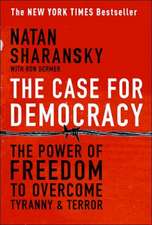The Middle East: Ten Years After Camp David
Editat de William B. Quandten Limba Engleză Paperback – sep 1988
Within the Middle East, the Camp David Accords are the subject of great debate. Many in the Arab world, and even some in Israel, regard them with hostility. Others, especially in the United States, see in the Camp David formula the only hope for successful resolution of the Arab-Israeli conflict and lavish praise on the accords. But the broad impact of the accords on the Middle East and on the prospects for peace has never been fully analyzed by Middle Eastern or American specialists. This new work, published to mark the tenth anniversary of the accords, offers the comprehensive assessment necessary to discuss the next steps in the Middle East peace process.
Now more than ever Americans need to understand how the Camp David Accords affected the entire Middle East region—not just Egypt and Israel—to deal with the complexities of future peace efforts. The authors provide an analytical basis for understanding the intricate links among domestic political forces, regional politics, and superpower policies as elements in the Arab-Israel peace process. By examining the past, the authors also show how to clarify choices that may confront Israelis and Arabs as they continue to work toward a settlement of their longstanding dispute.
Now more than ever Americans need to understand how the Camp David Accords affected the entire Middle East region—not just Egypt and Israel—to deal with the complexities of future peace efforts. The authors provide an analytical basis for understanding the intricate links among domestic political forces, regional politics, and superpower policies as elements in the Arab-Israel peace process. By examining the past, the authors also show how to clarify choices that may confront Israelis and Arabs as they continue to work toward a settlement of their longstanding dispute.
Preț: 244.02 lei
Nou
Puncte Express: 366
Preț estimativ în valută:
46.69€ • 48.75$ • 38.64£
46.69€ • 48.75$ • 38.64£
Carte tipărită la comandă
Livrare economică 04-18 aprilie
Preluare comenzi: 021 569.72.76
Specificații
ISBN-13: 9780815772934
ISBN-10: 0815772939
Pagini: 530
Dimensiuni: 152 x 229 x 32 mm
Greutate: 0.71 kg
Editura: Brookings Institution Press
Colecția Brookings Institution Press
ISBN-10: 0815772939
Pagini: 530
Dimensiuni: 152 x 229 x 32 mm
Greutate: 0.71 kg
Editura: Brookings Institution Press
Colecția Brookings Institution Press
Notă biografică
William B. Quandt is Edward R. Stettinius Professor of Politics at the University of Virginia, and was formerly a senior fellow in Foreign Policy Studies at the Brookings Institution. During the Nixon and Carter years, he served on the staff of the National Security Council and was deeply involved in the first Camp David negotiations, which led to the Egyptian-Israeli peace treaty.
Descriere
Within the Middle East, the Camp David Accords are the subject of great debate. Many in the Arab world, and even some in Israel, regard them with hostility. Others, especially in the United States, see in the Camp David formula the only hope for successful resolution of the Arab-Israeli conflict and lavish praise on the accords. But the broad impact of the accords on the Middle East and on the prospects for peace has never been fully analyzed by Middle Eastern or American specialists. This new work, published to mark the tenth anniversary of the accords, offers the comprehensive assessment necessary to discuss the next steps in the Middle East peace process.
Now more than ever Americans need to understand how the Camp David Accords affected the entire Middle East region—not just Egypt and Israel—to deal with the complexities of future peace efforts. The authors provide an analytical basis for understanding the intricate links among domestic political forces, regional politics, and superpower policies as elements in the Arab-Israel peace process. By examining the past, the authors also show how to clarify choices that may confront Israelis and Arabs as they continue to work toward a settlement of their longstanding dispute.
Now more than ever Americans need to understand how the Camp David Accords affected the entire Middle East region—not just Egypt and Israel—to deal with the complexities of future peace efforts. The authors provide an analytical basis for understanding the intricate links among domestic political forces, regional politics, and superpower policies as elements in the Arab-Israel peace process. By examining the past, the authors also show how to clarify choices that may confront Israelis and Arabs as they continue to work toward a settlement of their longstanding dispute.










